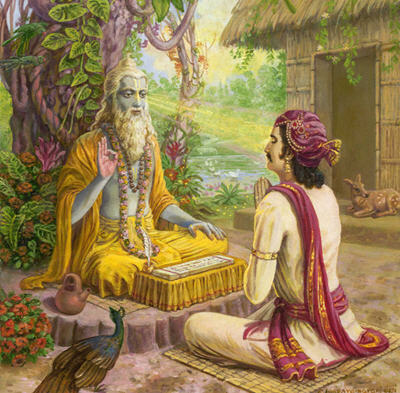Initiation into Krishna Consciousness

Our Vedic sastras say that every human being is born as a sudra - not as brahmin. "janmanA jAyate sudrah". So, it is not by birth one becomes brahmin; otherwise the sastra would not have stated like this.
The sastras also say that one must get a second birth (spiritual initiation) to engage in devotional life. It is said that if one does not get this, he is considered no better than animal. Only when one gets initiated by a bonafide and self realized guru, one's chanting and devotional life (sadhana) will bet effective and successful.
When a devotee decides to enter into devotional life in Krishna Consciousness, he/she must approach and surrender to a guru.
There are various levels of initiation as follows:
1. Hari Nama
This is the first thing to be received from a guru. At this time, the guru gives a spiritual name for the initiated.
Here are the rules to follow once hari nama initiation is taken:
- No meat eating
- No intoxication
- No Gambling
- No illegal sex and related of any kind
2. Gopala Mantra
When a disciple feels to go advanced and want to take to the next step, one can ask the guru who may give the Gopala Mantra. Receiving Gopala Mantra allows one to engage in deity worship.
Here are the rules to follow once Gopala Mantra is received:
- Follow all the above 4 rules as for the hari nama initiation
- Do not eat onion or garlic
- Follow ekadasis and auspicious days
- Perform Sandhya vandana three times a day reciting the Gopala mantra - once in the morning before sunrise, once at the mid-noon and then at the evening just after sunset.
3. Diksha
Diksha involves set of all the mantras (except gopi mantra which is given only to the sanyasis). They are:
- Gayatri mantra (only for men)
- Guru mantra
- Guru Gayatri mantra
- Gaura mantra
- Gaura Gayatri mantra
- Gopala Mantra (also called Krishna mantra)
- Kama Gayatri mantra
- Pancha tattva mantra
- Maha mantra
Strictly perform Sandhya vandana three times a day reciting all the above mantras - once in the morning before sunrise, once at the mid-noon and then at the evening just after sunset.
When one receives diksha, the disciple is empowered to perform deity worship by having installed deities at home. The diksha disciple can also perform pujas and deity decorations in any Radha Krishna temple. It is also recommended that the deity installation is performed by one's guru who gave the diksha mantra. The guru may also engage the disciple in giving hari-kathas and classes when he sees spiritual advancement.
4. Vanaprastha
This is the first stage of renounced life. Even though one should leave the home and family and retire in an ashrama or forest, in the modern days this is not practical. One may stay at home but must be completely detached from the household life, living in a separate room. There is no additional mantra given. However one should accept a renounced dress from the guru so that the family members will know his detached life. The usual dress is bright colored saffron and stay away from any materialistic gatherings such as marriages, parties and such non-spiritual activities.
5. Sanyasa
This is the ultimate stage of devotional life in Krishna Consciousness. When one receives the sanyasa and the associated gopi mantra, he is also given a 'danda' with special fire sacrice. When sanyasa is received, one has to leave the home and live in an ashram or in the forest. He cannot live in the family. He must wear saffron colored dress and stay away from any materialistic gatherings - more strict than Vanaprasthas.
The Initiation Process
Initiation is normall done on special and auspicious days. To get any of the above initiation, one must bring a plate with few flowers and fruits along with dakshina to the initiating guru. In the vedic days, the disciples used to bring fire-wood to the guru for the yagna.
On the day of initiation, one must get up very early in the morning, take bath, apply gopi-chandan, wear clean dress and bring the above to the guru's place. Until the initiation is done, one should not drink or eat anything.
The guru then instructs the disciple and gets the promise that he/she will follow the rules and regulations strictly. The he gives the respective mantra(s) in the right ear of the disciple. These mantras should never be revealed to ANY one including one's own parents, spouse or relatives. If revealed, the power of the mantras vanish immediately and there is no way of getting it back in this life. So one must be extremely careful.
Initiation Fire Sacrifice (Yajna)
After initiations are given, a fire sacrifice is performed presided by the initiating guru. Those who are being initiated must attend the fire sacrifice and offer oblations in the fire promising that the initiated will strictly follow the rules and regulations and surrender one's body, mind and actions to the guru. Any male devotee receiving diksha will be given a brahminical thread at this time by reciting mantras by the initiating guru. Every one will be taking oath to follow the strict rules and use the spiritual names.
At the end, the initiated disciples are supposed to beg alms from any household men and women and then give all the collected alms to the guru who initiated and receive blessings.
Regular Sadhana, Satsanga and Guru Seva
Every initiated disciple must engage in dialy sadhana and attend satsanga as often as one can - at least once every week. The most important thing to advance is to engage in serving one's Guru and Vaishnavas. If all these are followed, spiritual advancement is surely achieved by the disciple.